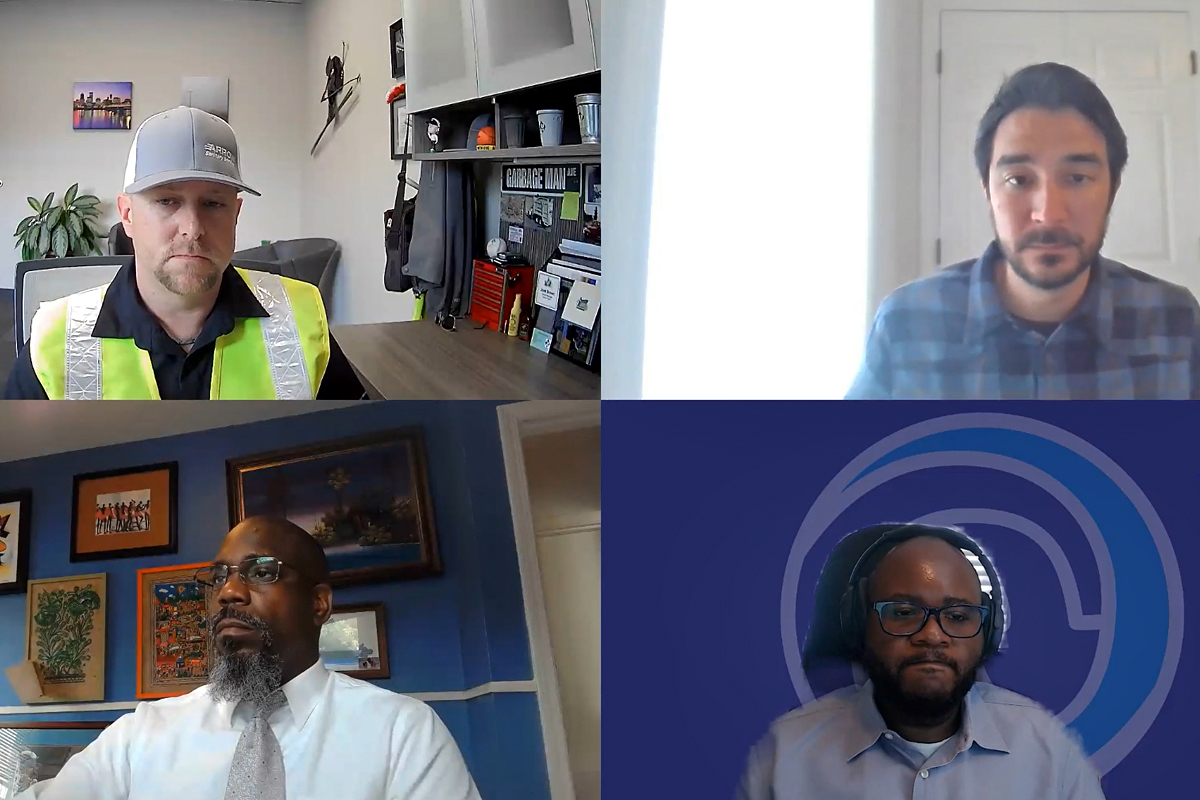
An Oregon program is addressing driver shortages by extending training to people who might otherwise struggle to become garbage and recycling collectors. | M2020/Shutterstock
Haulers are struggling to hire enough garbage and recycling drivers even as they work to increase diversity among the ranks. Meanwhile, many low-income and homeless people – including those with criminal backgrounds and little formal education – have only dreamed about such a steady, well-paying job.
An Oregon program called Driving Diversity in Portland is centered on the obvious solution: training people who struggle to enter a career to be garbage and recycling collectors, with an emphasis on women and people of color.
“It’s the most direct and clear way that we can provide qualified candidates into hauling jobs and create an opportunity for the people we serve,” said Patrick Gihring of nonprofit group Worksystems. “And it’s the most clear path for them to establish a qualified, diverse workforce into the hauling job.”
Gihring was one of four speakers who talked about the program during a June 2 webinar from the Association of Oregon Recyclers (AOR). The Driving Diversity program was initiated a year ago by the Portland Haulers Association and Worksystems, which helps train and prepare residents for careers, with the goal of supporting the staffing needs of regional businesses.
The workforce training program, currently serving its fifth class of students, has proven a solid model for developing candidates for hauling jobs. It comes at a key time, with labor shortages forcing some curbside collection programs around the country to cut back service and miss collection days.
Diversity studies lead to workforce training
The idea for the Driving Diversity program originates from diversity, equity and inclusion (DEI) assessments conducted at some Portland Haulers Association (PHA) member companies. About three years ago, PHA hired Johnell Bell and his consulting firm, Espousal Strategies, to conduct the assessments, which included identifying barriers to getting hired at the garbage and recycling companies.
One of those PHA members was Arrow Sanitary, which is owned by Waste Connections. Josh Brown, district manager for Arrow Sanitary, said during the webinar that his company was looking to diversify its workforce, being part of an industry that has primarily consisted of white males. Bell, founder and CEO of Espousal Strategies, came in to help the company develop a diversity and inclusion plan.
“Quite honestly, prior to the last several years, this just wasn’t a focus for our industry,” Brown noted.
Bell connected PHA with Gihring at Worksystems, and the parties developed the industry-specific training program, which has been funded by American Rescue Plan Act money flowing through the city of Portland. The PHA also puts money toward the training, and ample in-kind donations have been provided by the partners.
Interstate Trucking Academy, Oregon’s only African American-owned truck driving school, provides the training. Gary Hollands, co-director of Interstate Trucking Academy, told webinar viewers that the Driving Diversity program, which focuses on getting women and minorities into the transportation industry, expands upon a standard five- to eight-week course to obtain a commercial driver license (CDL).
Instead, each quarter, candidates go through a free 12-week program to train as garbage and recycling collectors. “Our goal is to get them a comprehensive, deep dive into the recycling and garbage industry,” Hollands said.
The course, which begins at 5 a.m. each day to give students a taste of a real-life collectors’ work schedules, covers driving from a right-side seat, fires in trucks, using automated arms to empty curbside carts, interacting with customers (especially young children) and more.
The course also involves job-shadowing haulers, Hollands said, which helps them get a sense of not just the job responsibilities but the day-to-day work culture in a male-dominated industry. The program prioritizes acceptance for women and people of color.
Graduates get a shot at working at one of the PHA member companies, which include the following mix of local and large corporate service providers: Arrow Sanitary Service, City Sanitary Service, Elmer’s Sanitary Service, Gruetter’s Sanitary Service, Heiberg Garbage & Recycling, Portland Disposal & Recycling, Republic Services, Sunset Garbage Service, Wacker Sanitary Service, Walker Garbage Services, and Waste Management.

Speaking on the Driving Diversity webinar were (clockwise from upper-left), Josh Brown of Arrow Sanitary/Waste Connections, Patrick Gihring of Worksystems, Johnell Bell of Espousal Strategies and Gary Hollands of Interstate Trucking Academy.
A dream for some, a good job for others
The program has solved problems for both companies and individuals.
Brown of Arrow Sanitary acknowledged the difficulty of recruiting for garbage and recycling truck driving jobs.
“Quite frankly, the garbage business has been really difficult to recruit and get people into the industry,” Brown said. “There’s not a lot of people that grow up … other than when you’re a kid … thinking, ‘Hey, I want to be a garbage person the rest of my life.'”
That being said, the positions are living-wage jobs in a stable industry, he noted.
Gihring said Worksystems’ clients are low-income people who want a career but need help. He noted that the program provides childcare and rental assistance to Driving Diversity students, so they’re not forced to drop-out to address living concerns.
Gihring pointed out that the average cost of childcare for an infant in the Portland area is $2,000 a month. “It creates a barrier where they can’t get into a family-wage job because they don’t have a family-wage job,” he said.
The program pays for childcare for about a year after clients begin the training, giving them time to land a job and start bringing home paychecks so they can support themselves, he said.
Driving Diversity also pays rental housing costs for students, some of whom are homeless and/or have zero income. “It just takes away this pressure of ‘I need to get an emergency job. I can’t do this training,'” he said.
Gihring estimated 40-50 students have graduated from the course over the past year-plus, with about 60-70% of them landing jobs at PHA-member companies.
“There’s been quite a few people that this is the thing that they’ve dreamed of, the thing that they wanted to do,” he said, “and there’s people that never thought about it but it turned out to be a good match.”
The program has examples of formerly homeless people who, after they were hired, could afford a nice place to live and a couple of cars, Gihring said. Hollands noted his biggest takeaway with the program is the “appreciation of our students when they get these jobs.”
Improving and expanding the program
The webinar speakers said they’re continuing to expand and improve the Driving Diversity program. Gihring said the participants would like to “right size” the recruitment to better match the number of PHA-member jobs available, with a goal of at least 75% of graduates getting hired.
“We don’t want to waste anyone’s time,” he said. “We don’t want to create expectations we can’t meet in terms of … open positions within the industry.”
Additionally, relatively few immigrants enter the Driving Diversity program, with some immigrant communities having a stigma around handling garbage. That’s a challenge program partners would like to address.
Brown said Arrow Sanitary has learned it has had to adjust its HR manuals and hiring practices related to background checks to bring some program graduates on board. His company has also waived requirements for previous driving experience, he said, noting that Waste Connections is self-insured, so its requirements may be different from those of insurance policies held by other haulers.
Brown also acknowledged that program graduates require more on-the-job training – 8 to 10 weeks – than other hires. In addition to helping his company’s operations, the program has helped it achieve broader workforce diversity goals by local city and regional governments, he said.
Hollands noted that the partners are looking to expand the program to other communities near Portland and into other areas of Oregon – potentially tapping state money, such as Future Ready Oregon funding – for a wider expansion.


